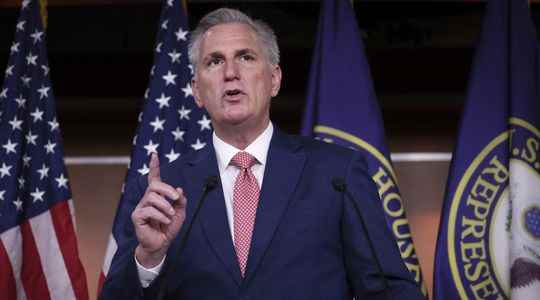Will the future of the war in Ukraine be decided in the United States? As the date of the midterms, scheduled for November 8 in the land of Uncle Sam, approaches, uncertainty grows as to the impact on the conflict of a Republican victory. Fear ? May it lead in its wake to a drop in military support granted to kyiv. The elected Republican Kevin McCarthy – who could become the next boss of the House of Representatives in the event of victory of the Grand Old Party (GOP) -, put his feet in the dish on October 18. “I think we’re going to end up in a recession and we’re not going to write a blank check to Ukraine. It’s not possible,” he said in an interview with the site. Punchbowl News. “Among other powers, the House of Representatives can vote on the budget, explains Martin Quencez, deputy director of the Paris office of the German Marshall Fund. A victory for the Republicans would allow them to decide on the level of the next aid envelope for Ukraine. .”
Within the party, some no longer hide their desire to put an end to it. “A Republican-led chamber will serve America’s needs first. We cannot continue with unlimited spending on any foreign country while our people struggle to get by at home,” the 20 october on Twitter Indiana Representative Jim Banks, who is running for his own estate. Before him, the elected pro-Trump of Georgia, Marjorie Taylor Greene, had already indicated in a video have a “major problem” with “the tens of billions of Americans’ hard-earned dollars that are spent defending another country’s borders”.
“Two tendencies coexist within the Republican Party”
This position is not shared by all members of the GOP. On Sept. 21, Senate Minority Leader Mitch McConnell called on the Biden administration to “do more to provide the tools Ukraine needs to thwart Russian aggression.” Or more anti-aircraft systems and long-range weapons. The same day, in an exclusive interview with The Expressthe former head of the American diplomacy of Donald Trump, Mike Pompeo, also called on the United States to “provide Ukraine with all the armaments it needs and for as long as it wishes” to “stop Putin” .
If, last May, 57 elected Republicans in the chamber had voted against a 40 billion dollar aid program for Ukraine, a large majority of the party had validated the envelope. “It seems unlikely that a Republican victory in the chamber will translate overnight into the end of American military aid, judge Martin Quencez. On the other hand, we can expect them to negotiate their votes fiercely.” Still a minority, the share of Republican voters who believe that US aid to Ukraine is too much has increased in recent months. From 17% in May, it rose to 32% in September, according to a survey from the Pew Research Center.
“There are two tendencies that cohabit within the Republican Party: the traditional wing, historically opposed to Russia, supports Ukraine, and the Trumpist wing, more isolationist, shows little or no interest. for this conflict, notes Annick Cizel, professor-researcher at the Sorbonne Nouvelle University – Paris 3 and specialist in American foreign policy.In the event of a Republican majority in the chamber, the balance of power between each faction will weigh on politics at respect to Ukraine.”
Turmoil in the Democratic camp
Beyond the debate on a pure and simple cut in aid, their nature could be reassessed. “A cessation of military support seems unlikely, but non-military aid, for example concerning reconstruction, less in the Republican tradition, could be revised downwards”, continues the researcher. A way for the party to reduce the overall bill, without leaving kyiv to its own fate. Especially since, according to Branislav Slanchev, a political scientist at the University of San Diego in California, Washington’s support for armaments benefits American industry. “The equipment sent to Europe was taken from our stocks. These billions of dollars were therefore not taken from our current expenses, because everything had been paid for a long time! To replenish these stocks, American manufacturers will sign new contracts and create jobs…”
In any case, the question of aid has also recently caused a stir within the Democratic camp. In a letter published at the end of October, several left-wing elected officials had thus called on the White House “to redouble its efforts to seek a realistic framework for a ceasefire”, referring to “the way in which dozens of of billions of dollars from the American taxpayer”. Before backpedaling in stride, explaining that he regretted that this initiative was “associated” with the remarks “of the Republicans who want to withdraw American support for President Zelensky”.
“The evolution of the economic situation in the United States could go beyond the divide between Republicans and Democrats and have a decisive weight on the continuation of aid provided to Ukraine, summarizes Martin Quencez. If the population faces a lasting crisis, lawmakers on both sides can be expected to seek to moderate the extent of U.S. support.”
